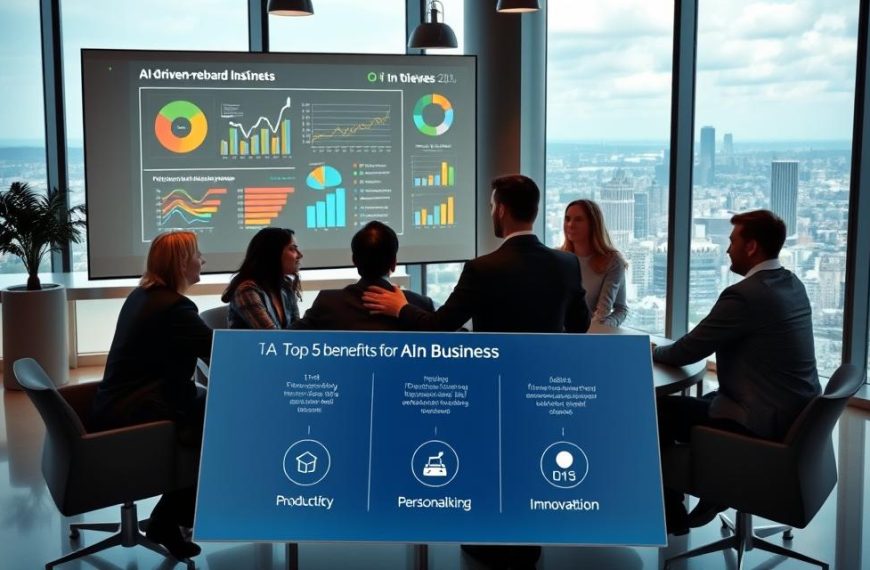Artificial intelligence has come a long way since its early days in the 1950s. What began as experimental technology reserved for large corporations has evolved into accessible, cost-effective tools for businesses of all sizes. Modern solutions now empower smaller companies to streamline operations, boost efficiency, and compete with industry leaders.
Today’s entrepreneurs face mounting pressure to work smarter. AI-powered systems help organisations tackle this challenge by automating repetitive tasks, analysing complex data sets, and generating actionable insights. These technologies aren’t just for tech giants anymore – they’re reshaping how UK businesses operate daily.
This guide explores ten practical strategies leveraging current AI advancements. Discover how tools for customer service automation, predictive analytics, and content creation deliver measurable benefits. Learn which platforms suit different budgets and sectors while maintaining compliance with UK regulations.
From reducing administrative workloads to personalising client interactions, these methods offer immediate value. We’ll break down real-world applications that improve productivity without requiring technical expertise. The right approach could transform your operations before the week’s end.
Introduction to the AI Business Revolution
From room-sized computers to pocket-sized solutions, intelligent systems have reshaped commercial landscapes. Organisations now harness tools once reserved for tech pioneers, driving innovation without requiring specialist teams. This shift marks a turning point where data-driven strategies define market leaders.
The Evolution of AI from Past to Present
Early experiments in the 1950s focused on basic problem-solving. By the 2000s, cloud computing democratised access, allowing firms to analyse customer behaviour or optimise supply chains. User-friendly platforms today enable instant deployment – no coding expertise needed.
“The theory and development of computer systems able to perform tasks normally requiring human intelligence.”
Why AI is Essential for Modern Businesses
Market leaders achieve 3.5x higher customer satisfaction through automated insights, according to Aberdeen. Small enterprises now rival corporations by predicting trends and personalising services. Real-time data processing slashes decision-making time from weeks to minutes.
Firms ignoring these tools risk falling behind as competitors prioritise efficiency. Adaptable solutions cater to retail, finance, and logistics sectors alike, offering measurable growth without hefty investments.
How AI can be used in business
Forward-thinking companies leverage advanced tools to tackle time-consuming activities head-on. According to insights from AI applications in business, these technologies now handle administrative workloads while freeing teams to focus on strategic priorities.

Automating Routine Tasks and Operations
Manual processes like call transcriptions or diary management drain hours from busy teams. Platforms such as Otter and Wingman convert voice conversations into searchable text instantly. Scheduling tools like Motion analyse deadlines and preferences to build optimised calendars automatically.
Email management systems also shine here. Levity, for example, sorts inboxes using natural language processing, while Docuf.AI extracts data from documents without manual input. These time-saving solutions reduce errors and ensure consistency across repetitive workflows.
Enhancing Decision-Making With Data Analysis
Modern organisations rely on accurate insights to stay competitive. Intelligent systems process complex datasets to identify trends, forecast demand, or highlight operational bottlenecks. This data-driven approach enables quicker, evidence-based choices – from inventory adjustments to marketing budget allocations.
Predictive analytics tools go further, offering scenario modelling that manual methods can’t match. Teams spot opportunities weeks in advance, turning raw numbers into actionable strategies.
Improving Content Creation and SEO Strategies
Producing engaging materials no longer requires endless brainstorming sessions. Tools like ChatGPT generate draft copy, suggest topics based on audience behaviour, and refine tone for brand consistency. Specialised platforms even optimise content for search engines, balancing keywords with readability.
Grammar checkers and style editors polish texts, while image generators create visuals from simple prompts. This fusion of creativity and efficiency helps firms maintain a strong online presence without overwhelming their staff.
Leveraging AI for Marketing and Social Media
Modern marketing strategies thrive on precision and relevance, two elements advanced technologies now deliver at scale. Intelligent systems analyse customer behaviour to craft tailored campaigns, ensuring messages resonate with specific audiences. This approach boosts engagement while reducing wasted ad spend.
Personalised Content and Targeted Advertisements
Recommendation engines process browsing histories and purchase patterns to suggest products customers genuinely want. Amazon’s “Frequently Reordered” alerts and Netflix’s viewing suggestions exemplify this. Algorithms adapt imagery, offers, and messaging styles based on demographic data, increasing conversion rates by 35% in some sectors.
| Platform | AI Application | Impact |
|---|---|---|
| Amazon | Purchase predictions | 23% higher repeat sales |
| Netflix | Content recommendations | 80% viewer engagement |
| Connection suggestions | 45% profile interaction |
Utilising Social Media Insights to Boost Engagement
Real-time sentiment analysis tools monitor brand mentions across platforms, flagging urgent feedback. Teams adjust campaigns instantly, capitalising on trends or addressing concerns. LinkedIn’s newsfeed algorithms prioritise relevant job postings and industry updates, keeping users engaged longer.
These systems also identify optimal posting times and content formats. Marketers refine strategies using performance data, ensuring every post delivers maximum visibility. The result? Improved customer satisfaction and loyalty through timely, meaningful interactions.
Optimising Business Operations with AI
Operational excellence separates market leaders from competitors in today’s fast-paced commercial environment. Cutting-edge technologies now address inefficiencies that traditionally drain resources, offering tangible improvements across supply chains, production lines, and administrative functions.

Streamlining Processes through Predictive Analytics
Sophisticated algorithms analyse historical sales data, weather patterns, and supplier lead times to forecast demand with 89% accuracy. Retailers reduce overstock by 37% while maintaining optimal inventory levels. Manufacturers use these predictive maintenance solutions to monitor machinery vibrations and temperature fluctuations, flagging issues weeks before failures occur.
Implementing Automated Workflow and Management Systems
Unified platforms integrate procurement, logistics, and quality control into single dashboards. Automation tools handle invoice processing, shift scheduling, and compliance checks – slashing administrative workloads by 52%. Teams redirect saved hours towards innovation and client relationship building.
AIOps platforms exemplify this shift, correlating IT incidents with root causes in real time. One telecom provider reduced network outages by 68% using automated alerts. Such management systems don’t just cut costs – they future-proof operations against unforeseen disruptions.
Enhancing Customer Support and Engagement
Modern clients expect swift resolutions and personalised attention – demands that innovative technology now meets effortlessly. Intelligent systems handle routine queries while maintaining the human touch for complex scenarios, creating seamless interactions that build loyalty.
Deploying Chatbots and Virtual Customer Assistants
Platforms like Freshchat and Kustomer resolve common issues instantly, from tracking orders to resetting passwords. These virtual assistants operate 24/7, cutting average response times by 68% in sectors like retail. When queries exceed their capabilities, automated triage systems escalate cases to human agents with relevant expertise.
McDonald’s partnership with IBM watsonx illustrates this approach. Their multilingual order-taking systems process natural speech, reducing errors in drive-through transactions. Such solutions free staff to address nuanced concerns requiring empathy – a balance that enhances customer experience across industries.
Utilising Sentiment Analysis for Improved Service
Advanced algorithms now detect frustration or confusion in real-time conversations. This technology triggers immediate interventions – whether routing calls to senior support agents or offering compensatory discounts. One telecom company reduced complaint escalations by 41% using these insights.
Natural language processing deciphers context and intent behind messages, enabling more accurate responses. Systems learn from successful resolutions, continually refining their knowledge bases. The result? Consistent service quality that adapts to individual client needs while maintaining operational efficiency.
Industry-Specific Innovations with Artificial Intelligence
Sector-specific challenges demand tailored technological responses. Companies now deploy advanced systems addressing unique operational demands while maintaining compliance with UK regulations. These innovations transform how organisations compete in crowded markets.

Applications Transforming Core Industries
Retailers harness machine learning for real-time inventory optimisation. Systems analyse purchasing trends to adjust stock levels, reducing waste by 29% in perishable goods sectors. Automotive manufacturers employ predictive maintenance, cutting equipment downtime by 41% through vibration pattern recognition.
Logistics firms achieve 35% faster delivery times using route optimisation algorithms. These solutions factor in traffic patterns, weather disruptions, and fuel efficiency. One UK courier service slashed missed deliveries by 58% after implementation.
Strategic Integration Across Key Sectors
Financial institutions combat fraud with transaction monitoring systems processing 1.2 million operations hourly. AI-driven solutions in banking detect suspicious patterns 14x faster than manual reviews. NHS trusts utilise diagnostic imaging tools, improving early cancer detection rates by 23% through enhanced scan analysis.
HR departments revolutionise recruitment with automated CV screening. Platforms prioritise candidates matching role-specific competencies, reducing hiring timelines by 67%. A London-based tech firm reported 42% higher employee retention after adopting skills-gap analysis tools.
“Customised implementations deliver 3x faster ROI compared to generic systems.”
Conclusion
Businesses embracing intelligent technologies today secure a decisive edge in fast-changing markets. The strategies outlined demonstrate tangible benefits – from streamlining repetitive tasks to enhancing customer satisfaction through personalised services. Organisations adopting these tools report measurable improvements in operational efficiency and decision-making speed.
However, successful implementation requires addressing critical challenges. Data quality issues, skills gaps, and ethical considerations around sensitive information demand proactive management. Firms must invest in staff training and robust compliance frameworks to maximise returns.
Those prioritising strategic adoption position themselves for sustainable growth. While upfront costs exist, long-term gains in productivity and market responsiveness outweigh initial hurdles. The ten approaches discussed offer actionable pathways – whether optimising supply chains or refining marketing strategies.
Delay risks irrelevance as competitors harness these technologies to redefine industry standards. Start small, focus on high-impact processes, and scale intelligently. The future belongs to businesses transforming challenges into opportunities through smart innovation.
FAQ
Can artificial intelligence reduce operational costs for small businesses?
Yes. Tools like Zoho Analytics and QuickBooks automate invoicing, inventory tracking, and financial reporting, cutting labour expenses. Machine learning models also optimise supply chains, reducing waste and improving resource allocation.
How does sentiment analysis improve customer satisfaction?
Platforms such as Brandwatch and Sprout Social analyse social media comments, reviews, and emails to gauge customer emotions. This data helps businesses address complaints proactively, tailor communication, and enhance service quality.
What role does predictive maintenance play in manufacturing?
Systems like Siemens MindSphere use sensor data and machine learning to forecast equipment failures. This prevents downtime, extends machinery lifespan, and ensures consistent production output in sectors like automotive and logistics.
Are there ethical concerns with AI-driven hiring processes?
While tools like HireVue streamline recruitment, biases in training data can affect fairness. Companies must audit algorithms regularly and combine AI insights with human oversight to ensure equitable candidate evaluation.
Can AI-generated content perform well in SEO strategies?
Absolutely. Tools such as SurferSEO and Jasper create keyword-optimised blogs, product descriptions, and meta tags. However, human editors should refine outputs to maintain brand voice and avoid generic phrasing.
How do chatbots handle complex customer service issues?
Advanced solutions like Intercom and Drift escalate intricate queries to live agents while resolving routine tasks (e.g., tracking orders). Natural language processing allows these systems to learn from interactions, improving accuracy over time.
Which industries benefit most from computer vision technology?
Retail uses it for cashier-less stores (e.g., Amazon Go), healthcare for diagnostic imaging analysis, and agriculture for crop monitoring. Facial recognition also enhances security systems in banking and public sectors.
Does automation compromise data security in finance?
Robust platforms like Darktrace employ AI to detect fraud and cyber threats in real time. Encryption protocols and multi-factor authentication further safeguard sensitive information during automated transactions.
Can predictive analytics improve retail inventory management?
Yes. Solutions like Blue Yonder forecast demand trends using historical sales data and market conditions. This reduces overstocking, prevents stockouts, and aligns procurement with consumer behaviour patterns.
What skills do employees need to work alongside AI systems?
Upskilling in data literacy, problem-solving, and ethical AI practices is crucial. Familiarity with platforms like Microsoft Power BI or Tableau aids in interpreting analytics, while adaptability ensures seamless human-AI collaboration.










